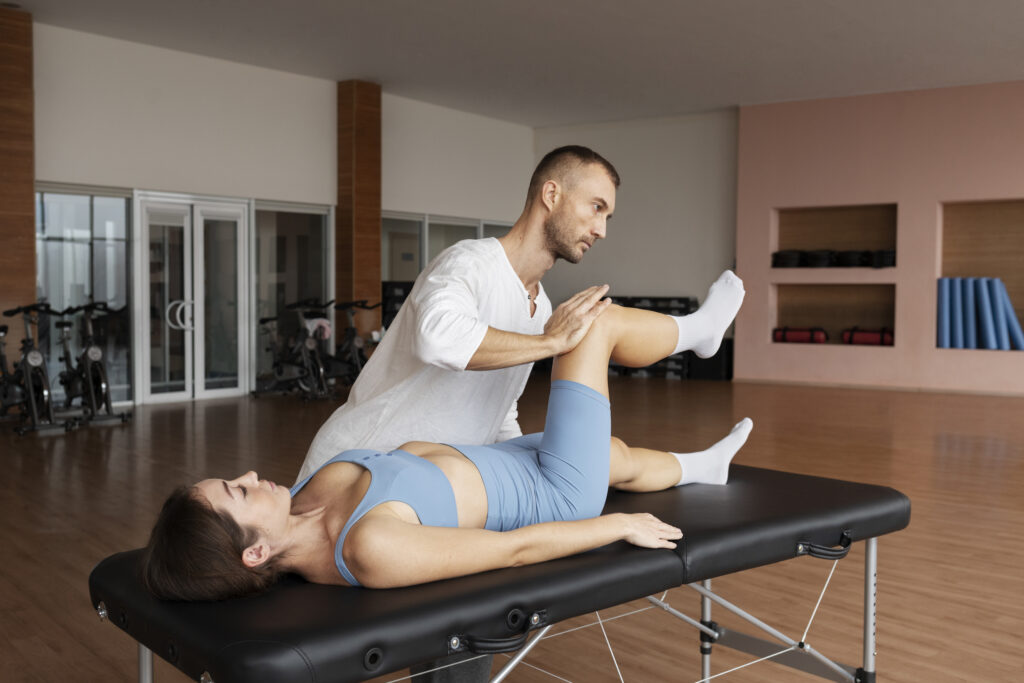
Have you recently survived a crash and are stuck in the pain? Worry not; many people surviving an accident often experience long-term injuries and recurring symptoms of pain and stiffness. Thanks to the physiotherapy clinics in Calgary, they are well-equipped to provide MAV injury treatment and help you recover from the aftermath of health issues to support your overall well-being.
Now let’s navigate the road to recovery, moving forward together on a path to motor vehicle accident treatment using physiotherapy techniques.
Physiotherapy Strategies for Motor Vehicle Accident Treatment in Calgary
Physiotherapy plays a crucial role in the recovery process after a motor vehicle accident. The below-mentioned points focus on how it helps revive mobility and physical fitness.
Pain Management
After an accident, patients experience pain due to injuries like whiplash, fractures, or soft tissue injuries. Various physiotherapy treatments help in managing this pain through techniques like massage, heat therapy, electrical stimulation, and exercises.
Restoration of Function
Accidents can result in loss of mobility or function due to injuries to muscles, ligaments, or nerves. Experienced physiotherapists guide patients through specific exercises and stretches to restore movement and regular physical functionality.
Strengthening and Conditioning
Generally, injuries weaken certain parts of the body and the muscles surrounding that area. Physiotherapy treatment with targeted exercises strengthens muscles and improves overall physical conditioning, which is crucial for recovery.
Improving Flexibility
Stiffness and a reduced range of motion are common after an accident. Here, a physiotherapy clinic in Calgary helps improve flexibility and reduce stiffness through various stretching exercises.
Posture Correction and Ergonomic Advice
Physiotherapists provide advice on proper posture and ergonomic changes to aid in recovery after an MVA. Poor posture and misplaced ergonomics after an accident can worsen pain and delay recovery.
Education and Support
Educating patients about their injuries, the recovery process, and ways to avoid further injuries is an important part of physiotherapy. This includes recommendations on lifestyle modifications, exercises to do at home, and strategies to manage pain.
Prevention of Chronic Conditions
Without proper treatment, injuries from accidents can lead to chronic pain or conditions like arthritis. Early intervention through physiotherapy can prevent these long-term complications.
Individualized Treatment Plans
Each accident and injury is unique; hence, physiotherapists develop personalized treatment plans after analyzing the patient’s specific injuries, health status, and recovery goals.
Supporting Mental Health
The psychological impact of motor vehicle accidents, such as stress, anxiety, or depression, can also be addressed through physiotherapy by promoting physical activity, which has been shown to improve mental health.
Assisting in Returning to Normal Activities
The ultimate goal of physiotherapy is to help patients return to their normal activities, whether it’s going back to work, engaging in sports, or simply performing daily tasks without pain.
Because physiotherapy is a holistic approach, it very well addresses the physical, psychological, and educational aspects of recovery from motor vehicle accidents while promoting healing and preventing future complications.
What are the most common MVA injuries?
The most common injuries resulting from motor vehicle accidents, more commonly called MVAs, can range from mild to severe, depending on the circumstances of the accident. Here are some of the most frequently encountered injuries.
Whiplash
This is a neck injury caused by a rapid back-and-forth neck movement, similar to the cracking of a whip. Neck injuries are most common in rear-end collisions.
Concussions and Traumatic Brain Injuries (TBIs)
These injuries can occur when the head is violently shaken or hits an object, leading to brain damage.
Soft Tissue Injuries
These include injuries to muscles, ligaments, and tendons. Sprains and strains are common soft tissue injuries of an MVA.
Spinal Cord Injuries and Paralysis
Damage to the spinal cord can be a serious result of a motor accident, potentially leading to partial or complete paralysis.
Chest Injuries
These injuries can range from bruises and contusions to more severe injuries like broken ribs or internal injuries, often caused by the steering wheel, dashboard, or seat belt.
Psychological Trauma
Psychological injuries such as post-traumatic stress disorder (PTSD), anxiety, and depression are also common that follow a traumatic event like a car accident.
Back Injuries
These can include herniated discs, spinal fractures, and lower back sprains and strains.
Conclusion
Each of the listed injuries can vary in severity and may require different levels of medical attention, from emergency care to long-term rehabilitation. Individuals involved in motor vehicle accidents must undergo a medical evaluation even if they feel fine immediately after the incident, as some injuries may not be spontaneously apparent, especially internal injuries.
Seeking expert advice and a professional medical approach can help avoid many unforeseen conditions and health problems later in life. Get personalized solutions on physiotherapy and massage treatments from Credence Physiotherapy & Massage Centre in Calgary and gain a healthy recovery from all pains and strains.

